The Washington Post columnist and author of The Working-Class Republican talks to Daniel P. Schmidt and Michael E. Hartmann about conservative philanthropy and its attitude toward populism, scotch neat, and It’s a Wonderful Life.
Henry Olsen’s thinking and writing, along with too few others, presaged both that which gave rise to Donald Trump in 2016 and that which will now have to succeed him if conservatism is to achieve any successes like those it has achieved in the past.
Olsen is a senior fellow at the Ethics and Public Policy Center (EPPC), a Washington Post columnist, and author of 2017’s well-timed The Working-Class Republican: Ronald Reagan and the Return of Blue-Collar Conservatism.
He previously has been vice president and director of the National Research Initiative at the American Enterprise Institute (AEI), vice president of programs at the Manhattan Institute, and president of Pennsylvania’s Commonwealth Foundation. In 2015, he co-authored The Four Faces of the Republican Party: The Fight for the 2016 Presidential Nomination with Dante Scala.
Olsen is known for his accurate political predictions and trenchant political and cultural analyses. He masterfully mixes data with insight.
Most recently, for example, Olsen conducted a national survey for EPPC and YouGov of Americans who voted for Trump in 2020. Released earlier this month, its findings offer evidence that Trumpian populism should be a big part of the future of conservatism, if it’s going to grow.
As shown in the data from the survey below, 2020 Trump voters who also voted for Barack Obama in 2012 were more working class or poor, less evangelical Christian, more religiously unaffiliated, and more liberal or moderate than those more-traditional Republican 2020 Trump voters who also voted for Mitt Romney in 2012.
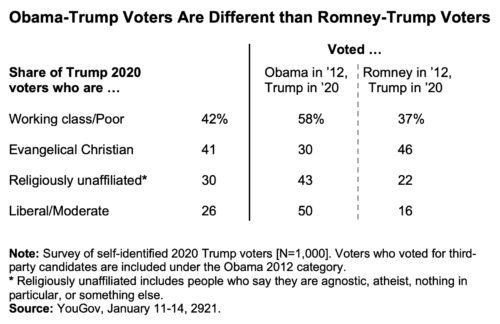
Olsen was kind enough to speak with us last week. The almost 13-minute video below is the first of two parts of our discussion; the second part is here. In the first part, we talk about whether there might be a component of conservative philanthropy that could be conceptually analogized to the Obama-Trump voters in the political context and what it might mean for conservatism if there hasn’t been or is not.
“Historically, conservative philanthropists have not been interested in speaking to these voters,” Olsen said. “They tend to be much more conventionally conservative. If anything, the donor class tends to lean farther in the anti-government direction than the voters within the Republican party as a whole, so they push in the opposite direction as a whole ….”
Looking forward, he continued,
what will be interesting is to see whether or not those donors will revert to their pre-Trump interest and be people who will be pushing the Republican coalition more in a small-government, low-taxes direction or whether they will have seen what Trump brought and say, well, maybe we need to move in a direction that finds the sweet spot between the populist voters who don't like conventional Republican and conservative policies and those who do. That would be a welcome development ….
We also have fun recalling a specific exchange we had with Olsen over drinks (his a scotch neat, he assures us) almost a decade ago about these same issues. Milwaukee’s Lynde and Harry Bradley Foundation, for which we worked at the time, funded his subsequent writing of The Working-Class Republican (in the acknowledgements section of which we’re included) and still supports his work.
Plus, we talk about It’s a Wonderful Life. “The essential problem of the Republican party,” Olsen notes, “is that they allow themselves to be characterized as Mr. Potter, when in fact Americans want to be governed by George Bailey.”
In the conversation’s second part, Olsen addresses Reaganism properly understood, and how Reagan can help conservatives and conservative philanthropy consider current challenges in facing the future.
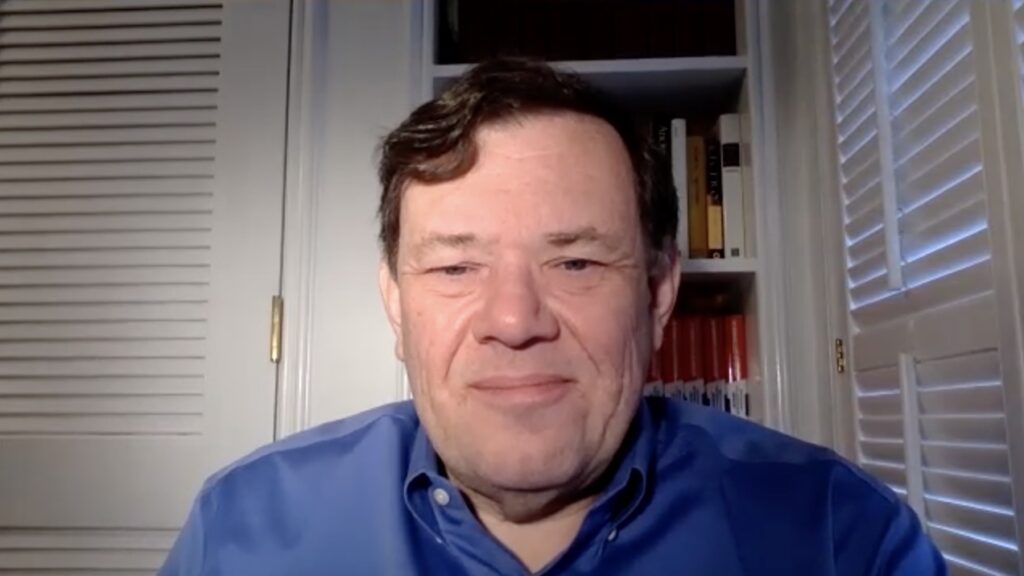



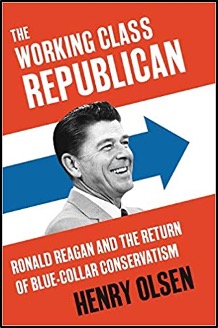
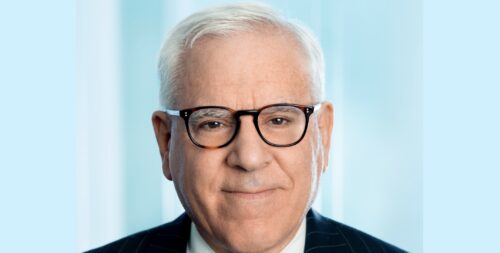
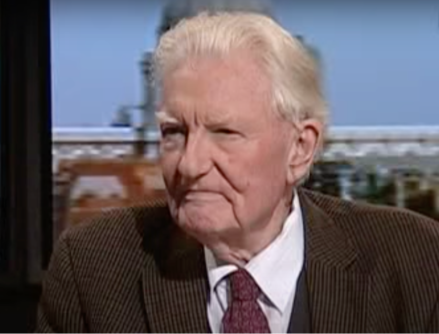
Henry Olsen is brilliant and insightful and helps explain Trump’s rise and shortfalls. I will want to read Part 2 to find out what he thinks about the future. You made a wise investment in supporting him I expect he will suggest reasonable paths to undergird a stronger conservative movement.
He made me remember Trump trusting GOP leaders in Congress to have a health plan and to back his efforts, including a border wall. He was let down and the mainstream GOP leaders didn’t want to touch him. Rush said part of the reluctance was that they believed the Russia hoax and considered Trump tainted and in trouble.